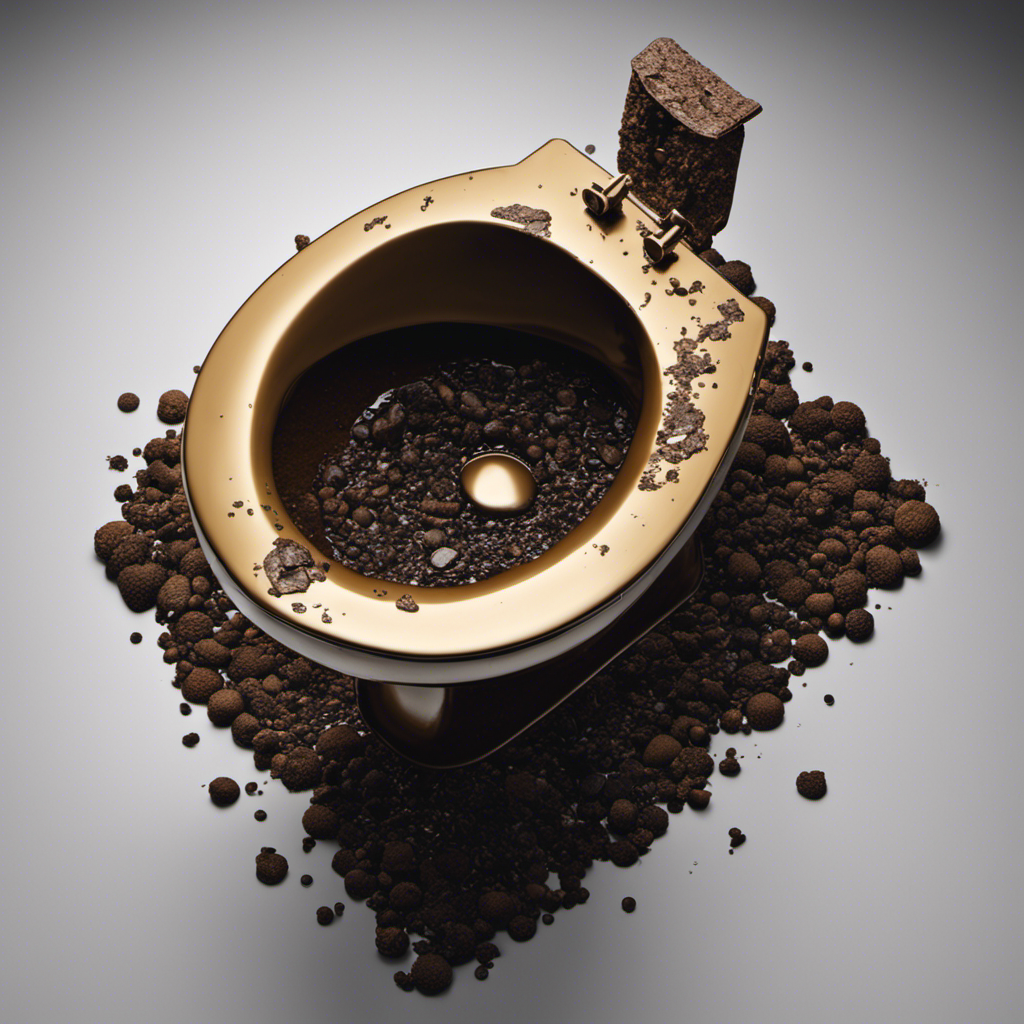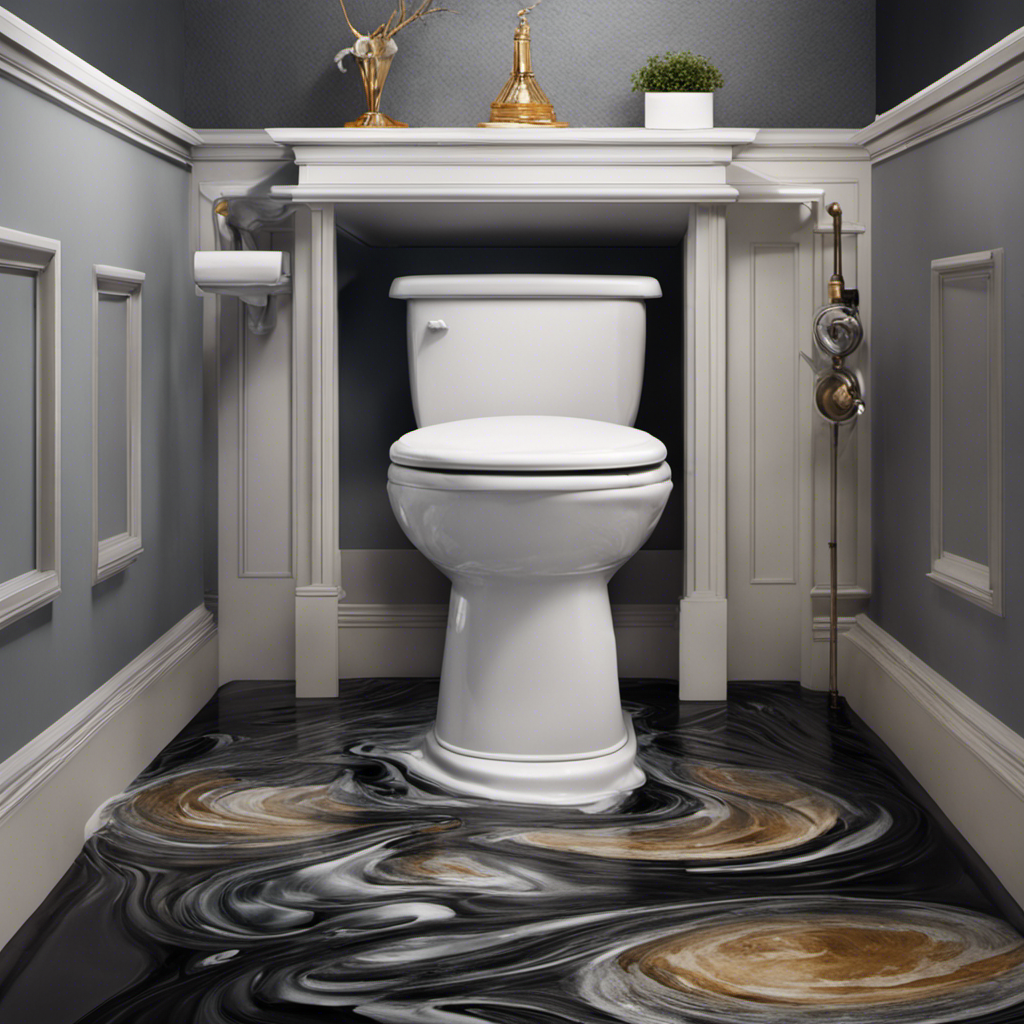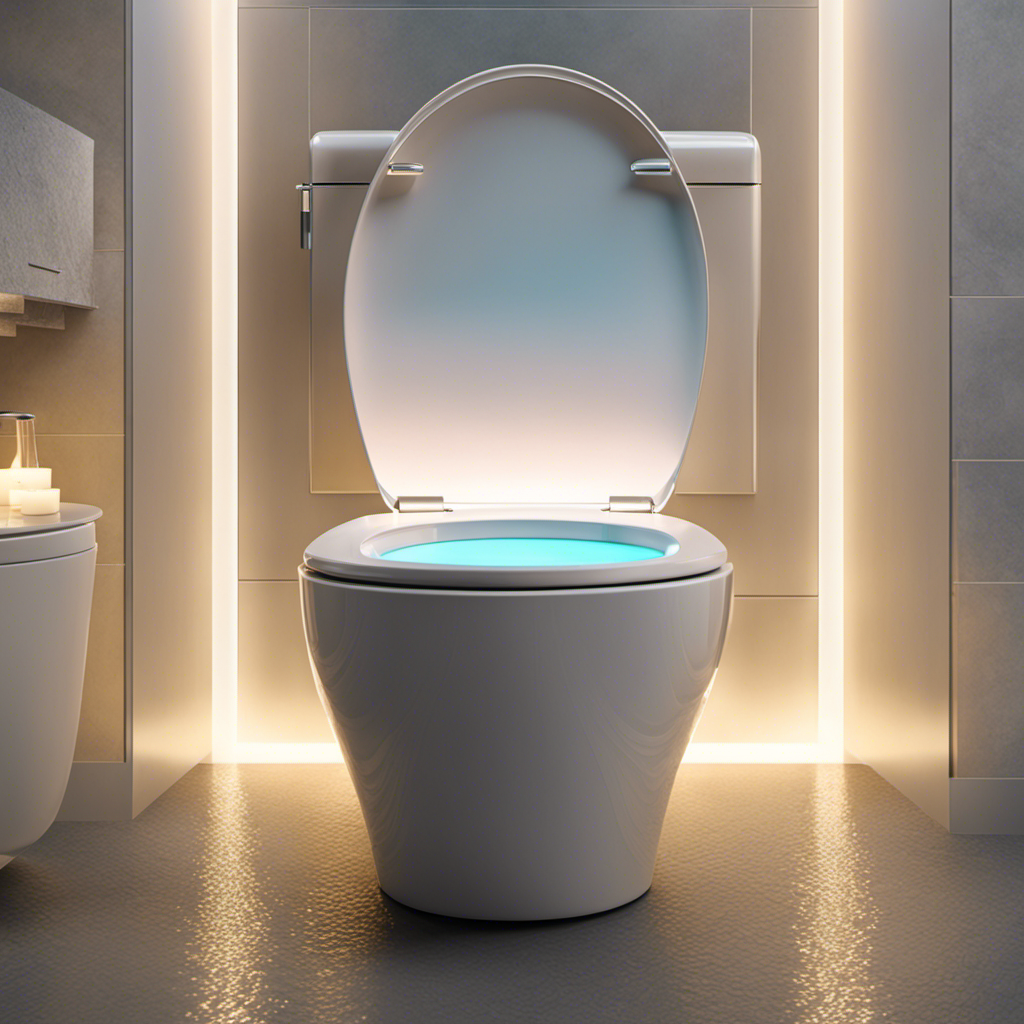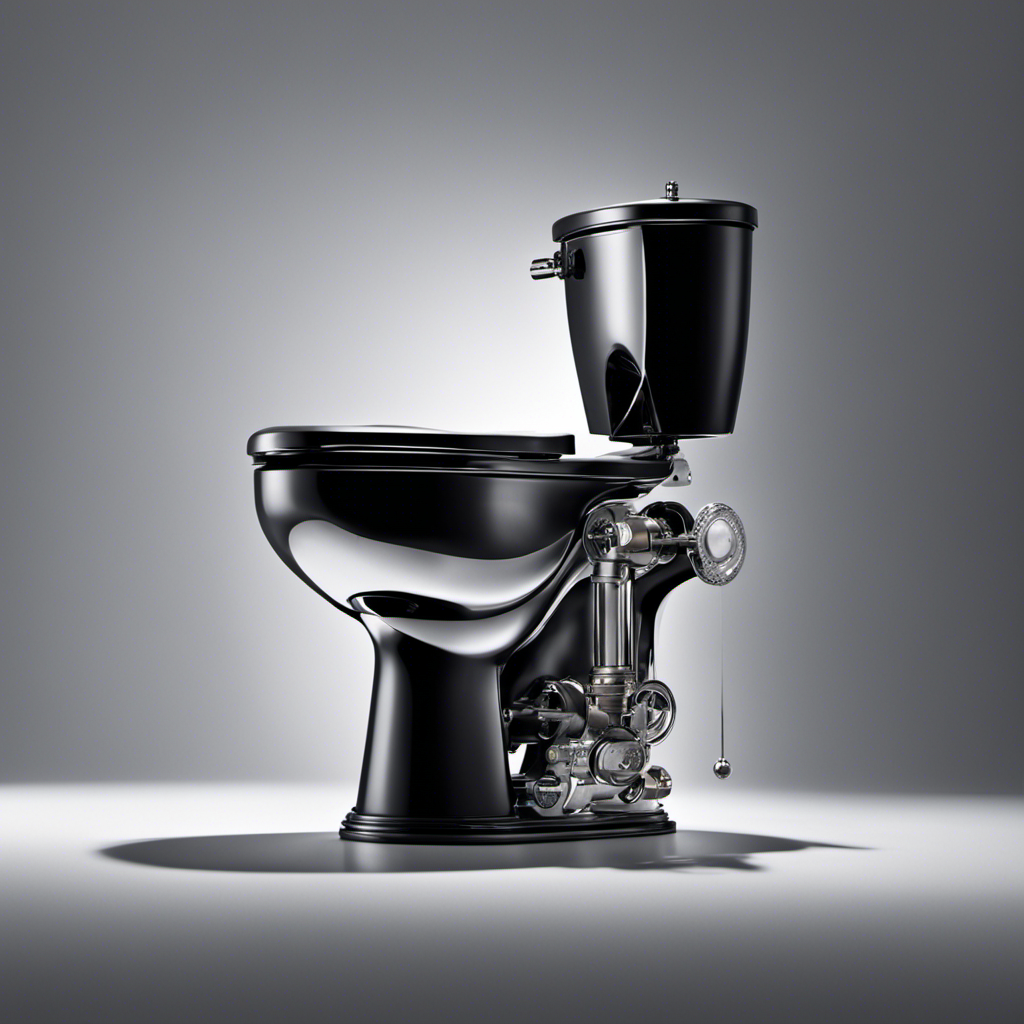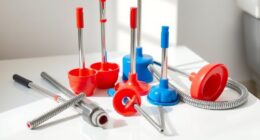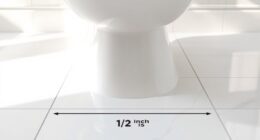Why does my poop fall apart in the toilet?
Have you ever wondered about the science behind the consistency of your stool? In this article, I will delve into the factors that affect poop texture, including how our diet plays a role in the structure of our waste.
Understanding the process of digestion and poop formation can help shed light on why sometimes our stool may be loose. I will also provide tips for improving poop solidity and when it might be necessary to seek medical help for abnormal poop texture.
Key Takeaways
- Poop consistency is affected by the amount of water present in the large intestine.
- A balanced diet rich in fiber promotes the growth of beneficial gut bacteria, which can affect poop texture.
- Proper hydration is crucial for maintaining adequate water content in the stool.
- Digestive disorders and certain medications can disrupt normal bowel movements and affect poop texture.
The Science Behind Poop Consistency
The science behind poop consistency can explain why it falls apart in the toilet.
Poop formation is a complex process influenced by various factors. The consistency of our feces is primarily determined by the amount of water present. A well-hydrated body produces softer stools, while dehydration leads to harder, drier ones.
The digestive system also plays a role in poop consistency. The small intestine absorbs nutrients, leaving waste material to pass into the large intestine. Here, water is reabsorbed, further affecting the consistency. Additionally, the presence of fiber in our diet can contribute to more formed stools.
When we pass stool, the pressure exerted by the rectum can cause it to break apart, especially if it is already loose or not well-formed.
Understanding the science behind poop consistency can help us maintain healthy bowel movements.
Factors Affecting Poop Texture
When it comes to the texture of your poop, there are several factors that can play a role.
Diet and hydration are key influencers, as what you eat and drink can impact the consistency of your stool.
Digestive disorders, such as irritable bowel syndrome or inflammatory bowel disease, can also affect poop texture.
Additionally, certain medications and supplements can have an impact on how your stool looks and feels.
Diet and Hydration
Eating a balanced diet and staying hydrated can help regulate the consistency of your poop. The presence of gut bacteria and proper water intake play crucial roles in maintaining healthy poop consistency.
Gut bacteria, also known as microbiota, are essential for digestion and nutrient absorption. These bacteria break down the food we eat, producing substances that affect the texture of our poop. A balanced diet rich in fiber promotes the growth of beneficial gut bacteria, which can help regulate bowel movements and prevent stool from falling apart.
Additionally, staying hydrated is vital for maintaining adequate water content in the stool. Drinking enough water helps soften the stool, making it easier to pass and preventing it from breaking apart in the toilet.
Digestive Disorders
Make sure you’re aware of the symptoms and seek medical advice if you experience digestive disorders. Digestive disorders can disrupt the normal functioning of your digestive system, leading to uncomfortable symptoms such as constipation and diarrhea.
Here are three common digestive disorders:
-
Irritable bowel syndrome (IBS): This disorder causes abdominal pain, bloating, and changes in bowel habits. It can be triggered by certain foods, stress, or hormonal changes.
-
Gastroesophageal reflux disease (GERD): This condition occurs when stomach acid flows back into the esophagus, causing heartburn and discomfort.
-
Crohn’s disease: This is an inflammatory bowel disease that affects the lining of the digestive tract, leading to abdominal pain, diarrhea, and weight loss.
If you’re experiencing any of these symptoms, it’s important to consult a healthcare professional for proper diagnosis and treatment.
Transitioning into the next section, medications and supplements can play a role in managing these digestive disorders.
Medications and Supplements
If you’re experiencing symptoms of digestive disorders, it’s important to discuss the use of medications and supplements with your healthcare professional. While there are natural remedies available, it’s crucial to understand the potential side effects of these treatments.
Certain medications, such as laxatives, can help relieve constipation by stimulating bowel movements. However, they may also cause diarrhea and abdominal cramping. On the other hand, fiber supplements can help regulate bowel movements and improve stool consistency, but they can also lead to bloating and gas.
It’s important to find the right balance and consult with your healthcare professional before starting any new medication or supplement.
Now, let’s explore how diet impacts poop structure and what you can do to maintain healthy digestion.
How Diet Impacts Poop Structure
When considering the impact of diet on poop structure, three key points come to mind:
-
Fiber and cohesion: Fiber plays a crucial role in maintaining the cohesion of stool by adding bulk and promoting smooth passage through the digestive system.
-
Hydration and stool consistency: Proper hydration levels are essential for maintaining optimal stool consistency. Adequate water intake helps prevent dry and hard stools.
-
Gut health and digestion: A healthy gut promotes efficient digestion, ensuring that nutrients are properly absorbed and waste is effectively eliminated. This results in well-formed and regular bowel movements.
Fiber and Cohesion
To improve the cohesion of your poop in the toilet, try increasing your fiber intake. Fiber is an essential nutrient that offers numerous benefits for digestive health. Here’s why it can make a difference:
-
Increased bulk: Fiber adds bulk to your stool, making it easier to pass and less likely to break apart in the toilet.
-
Improved water absorption: Fiber absorbs water, which helps to soften your stool and promote better bowel movements.
-
Enhanced digestive motility: Fiber stimulates the muscles in your digestive tract, promoting regularity and preventing constipation.
Hydration and Stool Consistency
Drinking enough water throughout the day helps keep your stool soft and easier to pass. Dehydration can lead to constipation, as it reduces the amount of water available for your body to use in the digestive process.
When you don’t drink enough water, your body tries to conserve it by extracting more water from your stools, resulting in dry and hard stools that are difficult to pass.
In addition to hydration, the role of gut bacteria is also important in maintaining healthy stool consistency. These bacteria help break down food and produce short-chain fatty acids that contribute to the softness of your stool.
Therefore, staying hydrated and promoting a diverse and balanced gut microbiota can help prevent constipation and ensure that your stool stays in a healthy and cohesive form.
Gut Health and Digestion
Maintaining a healthy gut microbiota is key for promoting proper digestion and overall gut health. The gut microbiome, which consists of trillions of microorganisms, plays a crucial role in breaking down food, absorbing nutrients, and regulating bowel movements.
When the balance of these microorganisms is disrupted, it can lead to digestive issues such as constipation. To maintain a healthy gut microbiome and alleviate constipation, consider the following remedies:
-
Increase fiber intake: Consuming a diet rich in fruits, vegetables, whole grains, and legumes can help promote regular bowel movements and prevent constipation.
-
Stay hydrated: Drinking an adequate amount of water throughout the day can soften stools and ease their passage through the digestive system.
-
Probiotics: Taking probiotic supplements or consuming foods like yogurt or sauerkraut can help replenish beneficial bacteria in the gut, promoting a healthy gut microbiome and improving digestion.
Understanding Digestion and Poop Formation
Understanding how digestion works can help explain why your poop may fall apart in the toilet.
The digestive system plays a crucial role in poop formation. It starts with the mouth, where food is broken down into smaller particles through chewing and mixed with saliva.
Then, it travels down the esophagus into the stomach, where it is further broken down by stomach acid and digestive enzymes.
From there, it enters the small intestine, where nutrients are absorbed into the bloodstream, leaving behind waste material.
This waste material, or poop, then moves into the large intestine, where water is absorbed, making it more solid.
Finally, the poop is stored in the rectum until it is eliminated through the anus.
If the digestion process is disrupted or if there is inadequate water absorption in the large intestine, the poop can become loose and fall apart in the toilet.
Health Conditions That Can Cause Loose Stools
If you have certain health conditions, such as irritable bowel syndrome or celiac disease, you may experience loose stools. Loose stools, also known as diarrhea, can be caused by various factors, including infection, medications, and food intolerances.
-
Infection: Bacterial, viral, or parasitic infections can lead to loose stools. These infections can be contracted through contaminated food or water.
-
Medications: Certain medications, such as antibiotics, can disrupt the balance of bacteria in the gut, leading to loose stools.
-
Food intolerances: Some individuals may have difficulty digesting certain foods, such as lactose or gluten, which can result in loose stools.
Treatment options for loose stools depend on the underlying cause. It is important to stay hydrated and replenish electrolytes lost through diarrhea. Over-the-counter medications, such as anti-diarrheals, can provide temporary relief. However, it is crucial to identify and address the root cause of the loose stools for long-term management.
Consulting with a healthcare professional is recommended for proper diagnosis and treatment.
Tips for Improving Poop Solidity
One way to improve the solidity of your stool is by increasing your fiber intake. Fiber plays a crucial role in improving bowel movements and preventing constipation.
When you consume enough fiber, it adds bulk to your stool, making it easier to pass and less likely to fall apart in the toilet. This is because fiber absorbs water and adds structure to the stool, promoting regularity and preventing excessive softness.
To increase your fiber intake, you can incorporate foods such as fruits, vegetables, whole grains, and legumes into your diet. Additionally, drinking plenty of water is important to help the fiber move through your digestive system effectively.
When to Seek Medical Help for Abnormal Poop Texture
After trying various tips to improve my poop solidity, it’s important to know when to consult a doctor if I notice abnormal poop texture. Here are some signs to watch out for:
-
Persistent Loose Stools: If my poop consistently has a watery or loose consistency for more than a few days, it could indicate an underlying health issue.
-
Excessive Hard Stools: On the other hand, if my poop is consistently hard and difficult to pass, it may be a sign of constipation or another digestive problem.
-
Unusual Colors or Odors: If my poop is consistently black, red, pale, or has a foul odor, it could indicate bleeding in the gastrointestinal tract or an infection.
If I experience any of these signs, it’s crucial to consult a doctor for a proper evaluation and diagnosis. They can provide necessary guidance and help identify any underlying conditions that may be causing the abnormal poop texture.
Frequently Asked Questions
How Often Should I Be Having a Bowel Movement?
I should be having a bowel movement regularly to maintain a healthy digestive system. Dietary changes, such as increasing fiber intake, can help regulate bowel movements and prevent poop from falling apart in the toilet.
Can Stress or Anxiety Affect the Consistency of My Poop?
Stress and anxiety can impact the consistency of my poop due to the intricate connection between the gut and the brain. Effective stress management techniques, such as relaxation exercises, can help regulate bowel movements.
Are There Any Medications That Can Cause Loose Stools?
Yes, certain medications can cause loose stools. They can disrupt the normal functioning of the digestive system, leading to diarrhea. It is important to consult a healthcare professional for advice on diarrhea prevention while taking these medications.
What Can I Do to Prevent My Poop From Falling Apart in the Toilet?
To prevent my poop from falling apart in the toilet, I can improve digestion and make dietary changes. By incorporating more fiber and staying hydrated, my stools will become more solid and easier to pass.
Can Dehydration Affect the Solidity of My Poop?
Dehydration can indeed affect the solidity of my stool. When I am dehydrated, my body absorbs more water from my stool, making it harder and more difficult to pass.
Conclusion
In conclusion, understanding the science behind poop consistency is essential for maintaining a healthy digestive system. Factors such as diet, digestion, and certain health conditions can all contribute to the texture of our poop.
By making small changes to our diet and lifestyle, we can improve the solidity of our poop. However, if you notice any abnormal changes in your poop texture, it is important to seek medical help.
Remember, just like a well-constructed puzzle, having well-formed poop is like fitting all the pieces together perfectly for optimal digestive health.
